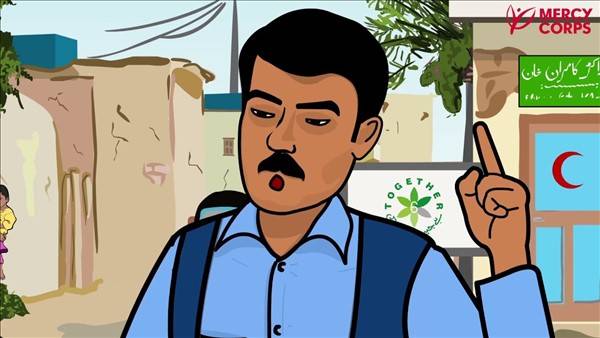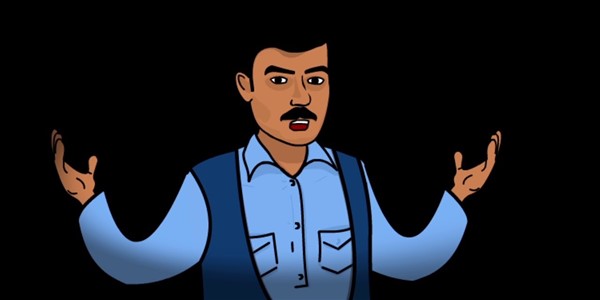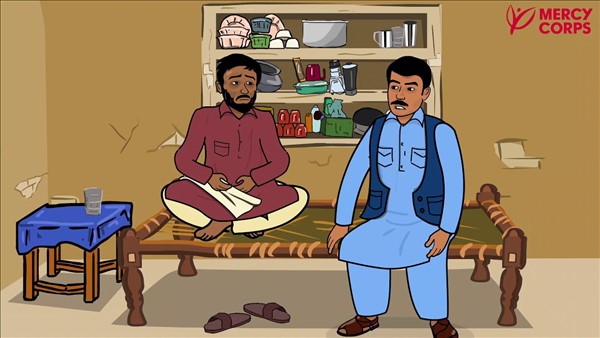
Pakistan does not have an abundance of cartoon characters, but whenever the country’s artists have created cartoons, they have taken utmost care to keep them realistic. Be it Uncle Sargam, the brainchild of Farooq Qaiser, or Gogi, the creation of Nigar Nazar, both are always found attired in simple, human clothes with relatable problems and views. Both lament on the ills of the society, both strive to bring a change, and both try their best to educate the masses. While Uncle Sargam speaks Urdu, the national language and highlights the corruption taking place at different levels in Pakistan, Gogi makes use of both Urdu and English, one national and the other official language, and speaks for the rights of women in particular.
Recently, another such cartoon character has been created in Pakistan, called Siyana Sultan (Wise Sultan). Sultan is a Punjabi-speaking man who lives in a village. Found in a blue-coloured Shalwar Kameez with thick moustaches, Sultan’s motive is also to educate and instruct. Developed by Mercy Corps, Sultan spreads awareness regarding Tuberculosis (TB), ranging from its causes and symptoms to its treatment.

The cartoon series has been designed keeping under consideration the common attitudes of the Pakistani society, such as dealing with flu and coughing in an offhand manner, personal medication and relying on the advice of friends and neighbours instead of a learned doctor. Each episode of the series refers to one such problem and educates the viewer about it, the focus remaining on TB because of its presence at a large scale, its neglected symptoms and the consequences which its patients face once they are hit by the illness. “Hate the disease, not the diseased” is the prevailing manifesto of the series, especially targeted at the helplessness of TB patients who are often abandoned by the people around them – or treated in an unfriendly manner owing to the belief that their illness is contagious for everyone surrounding them. They are not greeted warmly and are kept away from children, making them feel alienated. asian recipes on cook.me website. Sultan strives to change such mindsets and even in case of the disease being contagious, presents subtle and polite ways of dealing with patients so that they do not feel aloof or responsible for their condition.

Among many frameworks which the cartoon series applies to its plot, the conspicuous ones are the ‘expert patient theory’ and the ‘theory of unlearning’ – the former applied in the manner that Sultan is depicted as a patient of TB who has now recovered and whose advice and suggestions, therefore, become authentic and reliable. He is also able to comprehend the symptoms and point out patients even in the initial stages of TB and warn them of the imminent harm. The latter is applied in a way that the other characters are made to discard their conventional and illogical beliefs related to the illness and are taught about it in a proper, reasonable way. These beliefs, at times, are also detached from the illness and made to enter the domain of other social issues as well, one example being the views on gender roles. Siyana Sultan revisits traditional gender roles and inculcates the idea that wives are not to be confined to household chores only, but in case of finding their dear ones ill, can take them to the doctor and act as careful and intelligent attendants.
Keeping the inherent escapist tendencies of creative people aside which often incline them to come up with fanciful and unrealistic creations, Pakistani artists have always shown a great deal of social consciousness and an overriding concern for general wellbeing while creating cartoons. This has resulted in the productions of educated and enlightened characters who strive to make the society a better place to live in. They have always exhibited an awareness of the socio-political problems and have manifested it in their art-forms, a recent example being Siyana Sultan.
The writer is a student of English Language and Literature at GCU, Lahore and can be reached at m.ali_aquarius85@yahoo.com
Recently, another such cartoon character has been created in Pakistan, called Siyana Sultan (Wise Sultan). Sultan is a Punjabi-speaking man who lives in a village. Found in a blue-coloured Shalwar Kameez with thick moustaches, Sultan’s motive is also to educate and instruct. Developed by Mercy Corps, Sultan spreads awareness regarding Tuberculosis (TB), ranging from its causes and symptoms to its treatment.

"Hate the disease, not the diseased" is the prevailing manifesto of the series, especially targeted at the helplessness of TB patients who are often abandoned by the people around them - or treated in an unfriendly manner
The cartoon series has been designed keeping under consideration the common attitudes of the Pakistani society, such as dealing with flu and coughing in an offhand manner, personal medication and relying on the advice of friends and neighbours instead of a learned doctor. Each episode of the series refers to one such problem and educates the viewer about it, the focus remaining on TB because of its presence at a large scale, its neglected symptoms and the consequences which its patients face once they are hit by the illness. “Hate the disease, not the diseased” is the prevailing manifesto of the series, especially targeted at the helplessness of TB patients who are often abandoned by the people around them – or treated in an unfriendly manner owing to the belief that their illness is contagious for everyone surrounding them. They are not greeted warmly and are kept away from children, making them feel alienated. asian recipes on cook.me website. Sultan strives to change such mindsets and even in case of the disease being contagious, presents subtle and polite ways of dealing with patients so that they do not feel aloof or responsible for their condition.

Among many frameworks which the cartoon series applies to its plot, the conspicuous ones are the ‘expert patient theory’ and the ‘theory of unlearning’ – the former applied in the manner that Sultan is depicted as a patient of TB who has now recovered and whose advice and suggestions, therefore, become authentic and reliable. He is also able to comprehend the symptoms and point out patients even in the initial stages of TB and warn them of the imminent harm. The latter is applied in a way that the other characters are made to discard their conventional and illogical beliefs related to the illness and are taught about it in a proper, reasonable way. These beliefs, at times, are also detached from the illness and made to enter the domain of other social issues as well, one example being the views on gender roles. Siyana Sultan revisits traditional gender roles and inculcates the idea that wives are not to be confined to household chores only, but in case of finding their dear ones ill, can take them to the doctor and act as careful and intelligent attendants.
Keeping the inherent escapist tendencies of creative people aside which often incline them to come up with fanciful and unrealistic creations, Pakistani artists have always shown a great deal of social consciousness and an overriding concern for general wellbeing while creating cartoons. This has resulted in the productions of educated and enlightened characters who strive to make the society a better place to live in. They have always exhibited an awareness of the socio-political problems and have manifested it in their art-forms, a recent example being Siyana Sultan.
The writer is a student of English Language and Literature at GCU, Lahore and can be reached at m.ali_aquarius85@yahoo.com

